Why Everybody wants to learn Digital Marketing
1. Introduction: The Digital Shift
In today’s world, nearly everything is going online. From shopping and banking to entertainment and communication, the internet has become the default place. As a result, marketing too has shifted — businesses no longer just rely on billboards, flyers or radio ads. Instead, they use digital channels: social media, search engines, email, websites, mobile apps. This phenomenon is called digital marketing. Learning digital marketing isn’t just a niche option anymore. It’s increasingly becoming a mainstream skill that everyone — freelancers, job-seekers, business owners, students — wants to master.

2. What is Digital Marketing?
Before going further: by digital marketing we mean the use of digital channels (internet, social media, mobile devices, search engines) to promote products, services or brands and engage audiences
It includes activities like search engine optimisation (SEO), pay-per-click ads (PPC), social media marketing, email marketing, content marketing, mobile marketing and more. Because the world is so digital now, marketing has had to evolve, and so have the skills.
3. Why the Demand? Because Everyone Is Online
One of the simplest reasons everyone wants to learn digital marketing is because customers are online. For example, one article notes: “The average person spends roughly 7 hours every day online… two of those hours dedicated solely to social media browsing.”
If you want to reach people, you go where they are. Learning how to use those channels effectively becomes a key skill.
In a country like India, this is especially true: with 800+ million internet users, mobile-first audiences, the digital space is the primary marketplace.
So: seeing where the opportunity lies, many are motivated to pick up digital marketing skills.
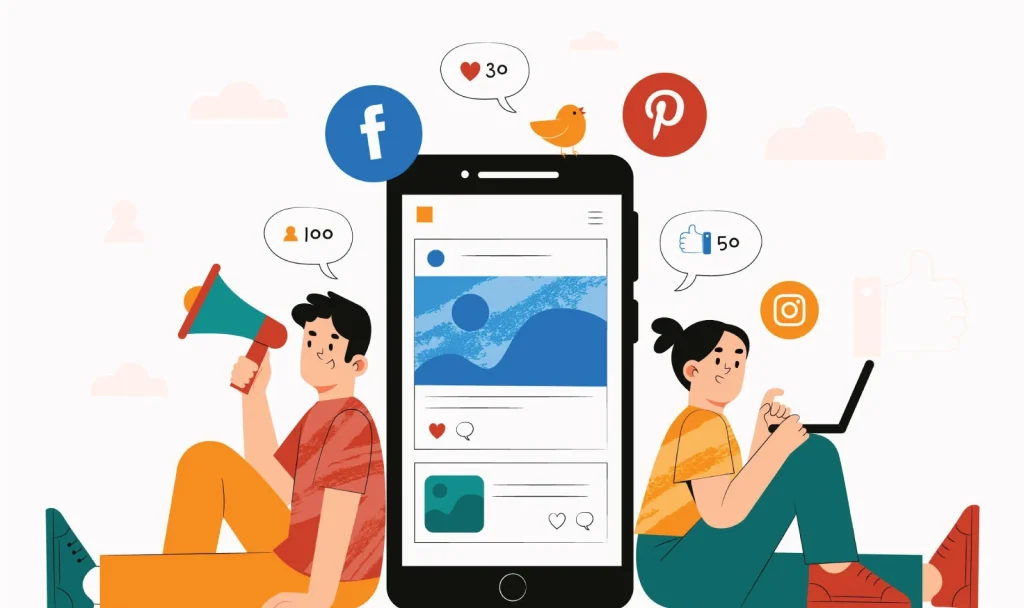
4. Career Opportunities: Versatility & Growth
When you learn digital marketing, you open up many different professional pathways.
- You can work as a digital marketing specialist, SEO consultant, social media manager, content marketer, PPC analyst.
- You can freelance, join agencies, start your own business.
- You can even apply these skills within non-marketing roles (because many businesses expect everyone to understand digital).
Because the demand is high, the skill set is valuable. That’s why “why everyone wants it” partly means: learning it enhances one’s employability, one’s business opportunity, one’s side-hustle possibility.
Also, because the digital landscape keeps evolving (new platforms, new tools, new algorithms), there is always fresh learning and growth — which appeals to ambitious learners.

5. Digital Marketing is Cost-Effective and Scalable
Another reason for its popularity: digital marketing tends to be far more cost-effective than many traditional marketing methods.
For example:
“Due to its affordability, digital marketing has levelled the playing field for smaller and medium-sized businesses … With a clear digital marketing strategy, even a small budget can help drive leads…”
Because of this, businesses of all sizes – startups, local shops, freelancers – want to know how to do it themselves or hire people who know how. That drives demand for knowledge and training.
Also: digital campaigns can often scale more flexibly — you can start small, test, optimise, expand. Traditional campaigns (print, TV, billboard) often require big budgets and irreversible commitments.
Thus, for someone wanting to learn a high-leverage skill, digital marketing is attractive.

6. Measurability & Real-Time Insight
One of the powerful differentiators of digital marketing: you can measure results, often in real-time, and use that data to optimise.
From articles:
“With digital marketing, you’ll have access to a huge source of data and metrics … impressions, views, time on a page, click rate… you can see accurate data in real-time.”
“Unlike traditional marketing, digital marketing provides businesses with valuable data that can be analysed to measure the effectiveness…”
For learners and practitioners, this is a big plus: you don’t have to work in the dark. You can test, track, adjust, learn. That appeals to the modern mindset of “learn by doing, see the results, optimise”.
And for businesses hiring people, they want someone who understands how to interpret and act on metrics — so for jobseekers, this makes digital marketing a more “future-proof” skill.
7. Global Reach & Personalisation
Digital marketing breaks geographic barriers. You can reach a global audience, or very precisely target a specific demographic, interest or behavior group.
From one source:
“Digital marketing enables businesses to reach a global audience, breaking down geographical barriers.”
Also: you can personalise marketing messages (tailored offers, segmented emails) rather than one-size-fits-all.
For someone learning the skill, this means big potential: you can serve clients or markets globally; you can build niche expertise; you can run campaigns or consulting beyond local borders.
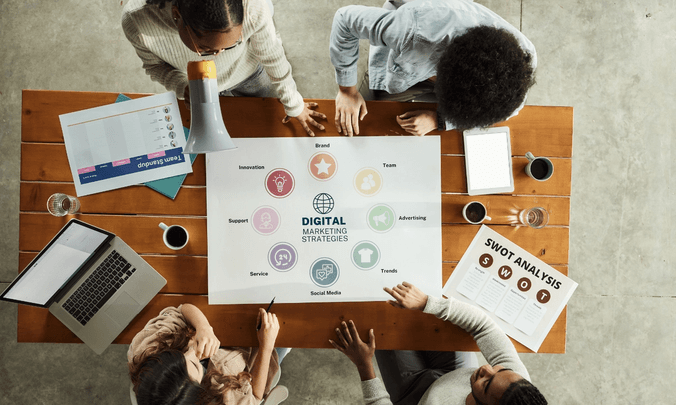
8. Relevance Across Industries
Learning digital marketing isn’t just for classic “marketing firms”. It’s relevant across industries: tech, retail, manufacturing, services, education. Because almost every business needs to show up online, attract customers online, engage people online.
Therefore, the skill transcends a single domain — giving learners flexibility. Also, for entrepreneurs or business owners, knowing digital marketing means you can avoid being just a “business owner” who depends on others to market; you can take control. That independence is attractive.
In other words: digital marketing is widely applicable, which is one reason everybody desires to learn it.
9. Adaptability to Changing Trends, Technologies & Platforms
The digital world is dynamic: new social platforms emerge, new algorithms, new tools (think AI, automation, voice search, video). This means digital marketing is not “static”. For learners, this can be exciting: you’re acquiring a skill set that evolves.
Also, the fact that the field changes means there are always new “frontiers”: early adopters of a new platform or tool often get an edge. That makes the domain attractive.
From research: the widespread adoption of AI in digital marketing is already changing how consumer engagement works.
So: if you like learning, evolving, staying current — digital marketing offers that.
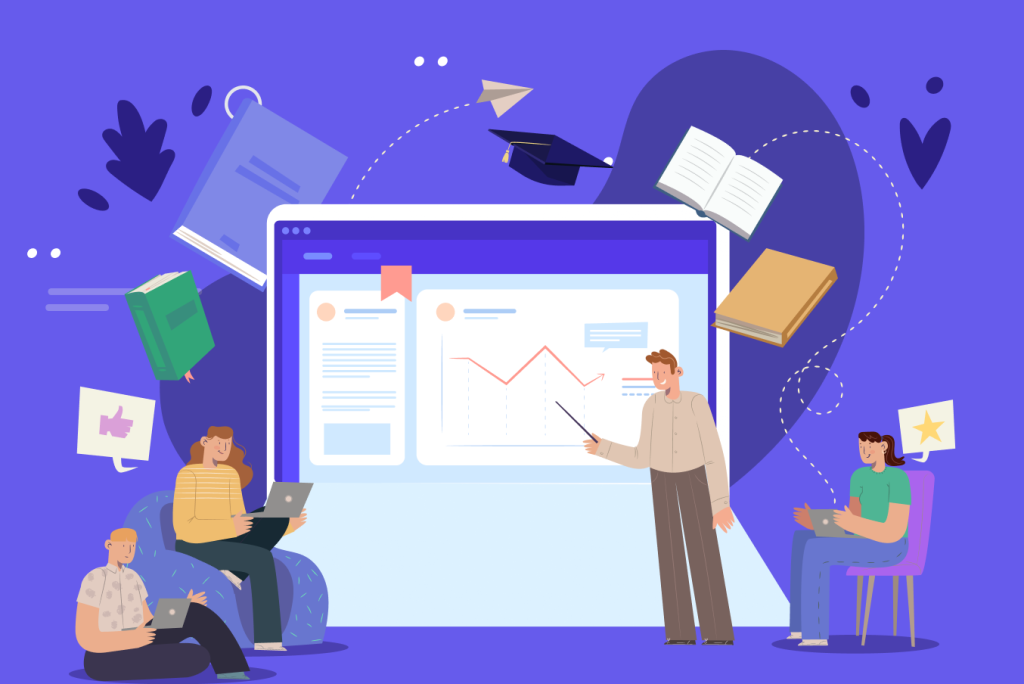
10. Empowerment: From Side-Hustle to Entrepreneurship
Many people are drawn to digital marketing because of the empowerment it offers. Whether you want a full-time job, a freelance income, or to start your own business, digital marketing skills help.
- You can run your own campaigns.
- You can help other small businesses with their online presence.
- You can monetise your content (affiliates, ads, social media).
- You can build personal brands.
That sense of control, possibility and upside is a big motivator. In an era where people want more flexible careers, more control, more “gig economy” options — digital marketing sits nicely in that space.
11. Competitive Advantage in the Job Market
For job-seekers, students, recent graduates: digital marketing offers a competitive advantage. Many roles now expect at least a basic understanding of digital marketing (even non-marketing roles) because businesses value online presence.
By acquiring digital marketing skills, one can differentiate themselves: “I know how to drive traffic”, “I know how to analyse digital campaigns”, “I know how to scale online growth”.
In competitive job markets (like in India), where many candidates may have generic degrees, having digital marketing knowledge can stand out. Thus there is a strong appeal for students and early-career professionals.
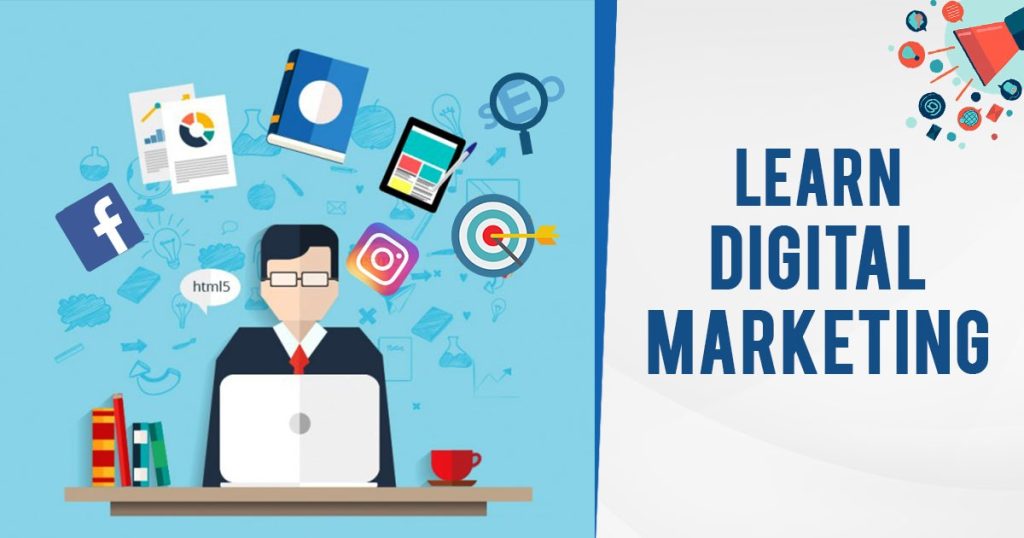
12. Why It’s Especially Relevant for Entrepreneurs and Small Businesses
If you run your own business, or plan to, digital marketing is almost non-optional. Because:
- You compete with larger players, but online you can level the field.
- You need cost-efficient ways to reach customers.
- You need to adapt quickly.
Learning digital marketing helps you not just hire someone, but understand what’s going on, ask the right questions, measure results, iterate. That self-reliance is increasingly valued.
Hence, many business-owners want to learn it for this reason.
13. Overcoming Obstacles & Myths
Of course, learning digital marketing isn’t without its challenges. Many people feel intimidated: “Isn’t it too technical?”, “So many tools, so many platforms!”, “Does it require coding?”
The good news: Basic digital marketing doesn’t require deep technical coding; it often needs analytic mindset, creativity, willingness to learn. Many platforms are user-friendly. Also, because so many people are learning it, there are abundant courses, tutorials, free resources.
Another myth: It’s “too saturated”. But the reality is: because trends and platforms keep shifting, new opportunities keep emerging. And even in saturated niches, those who specialise or are proficient still succeed.
So for learners: yes, it requires effort, but the upside is real.

14. The Future: Why It Will Keep Being Important
Looking ahead:
- More commerce will shift online (especially in mobile-first markets).
- Consumer behaviour will keep evolving (short-form video, voice search, AI chatbots, immersive experiences).
- Data and personalisation will become even more central.
- Businesses will need people who can combine analytics, creativity and digital marketing tools.
Thus, digital marketing skills are not a fad. They are likely to remain in demand for the foreseeable future.
From one source: “In today’s business environment, it’s essential for every company … to gain a foothold in the digital sphere.
So when you ask “why everybody wants to learn digital marketing?” one big part of the answer is: because it offers real value today, and seems likely to remain valuable tomorrow.
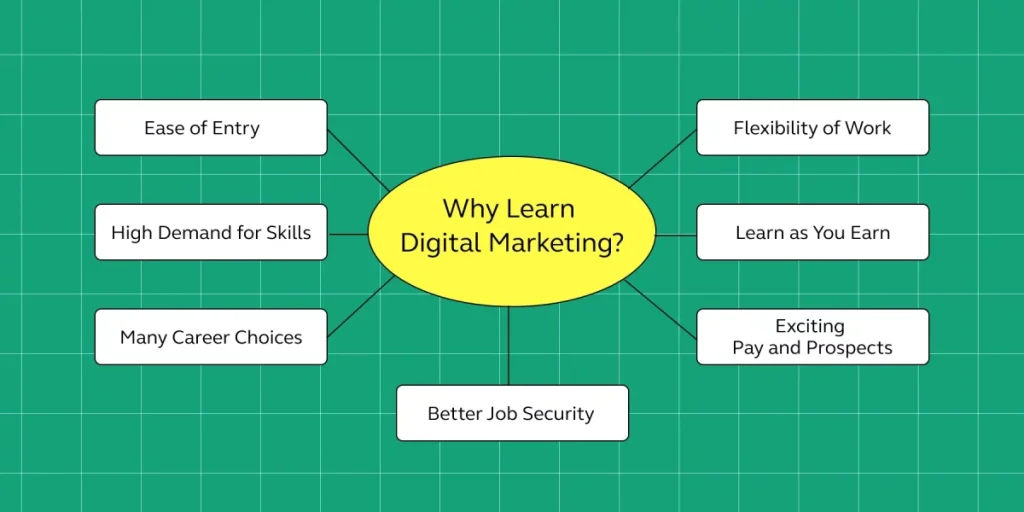
15. How to Get Started: Practical Steps
If you’re reading and thinking “I want to learn digital marketing too”, here are a few practical steps:
- Start with one channel (for example: social media marketing or SEO) rather than trying to master everything at once.
- Use free resources or credible courses. Many marketing blogs, YouTube videos, MOOCs exist.
- Build a small project: your own blog, social-media page, or help a friend’s business. Hands-on is best.
- Track results. Use analytics tools (Google Analytics, social media insights) to learn what works.
- Keep up with trends. The digital marketing field evolves — follow blogs, webinars, industry news.
- Consider specialisation: for example, you might become a PPC specialist, or content marketer for a niche industry, or a local-SEO expert.
- Build your portfolio: show real campaigns you’ve worked on, real results you’ve generated. That’s what employers/clients will ask for.
When well-done, learning digital marketing can be a powerful investment in your skills and career.
16. Conclusion: The Why Summed Up
To summarise: Everybody wants to learn digital marketing & SEO because it touches so many desirable attributes:
- Big reach (people online)
- High demand (businesses need it)
- Career flexibility (jobs, freelance, entrepreneurship)
- Measurable & data-driven (makes you more confident)
- Reasonably accessible (you can start with little cost)
- Future-oriented (digital is not fading)
- Industry-wide applicability (you can use it across roles)

In short: while “digital marketing” might sound like jargon, the underlying truth is simple: our world is online, and knowing how to use that space effectively is a major advantage. Whether you’re a student, a job-seeker, an entrepreneur, a freelancer — digital marketing offers you a way to tap into that advantage.